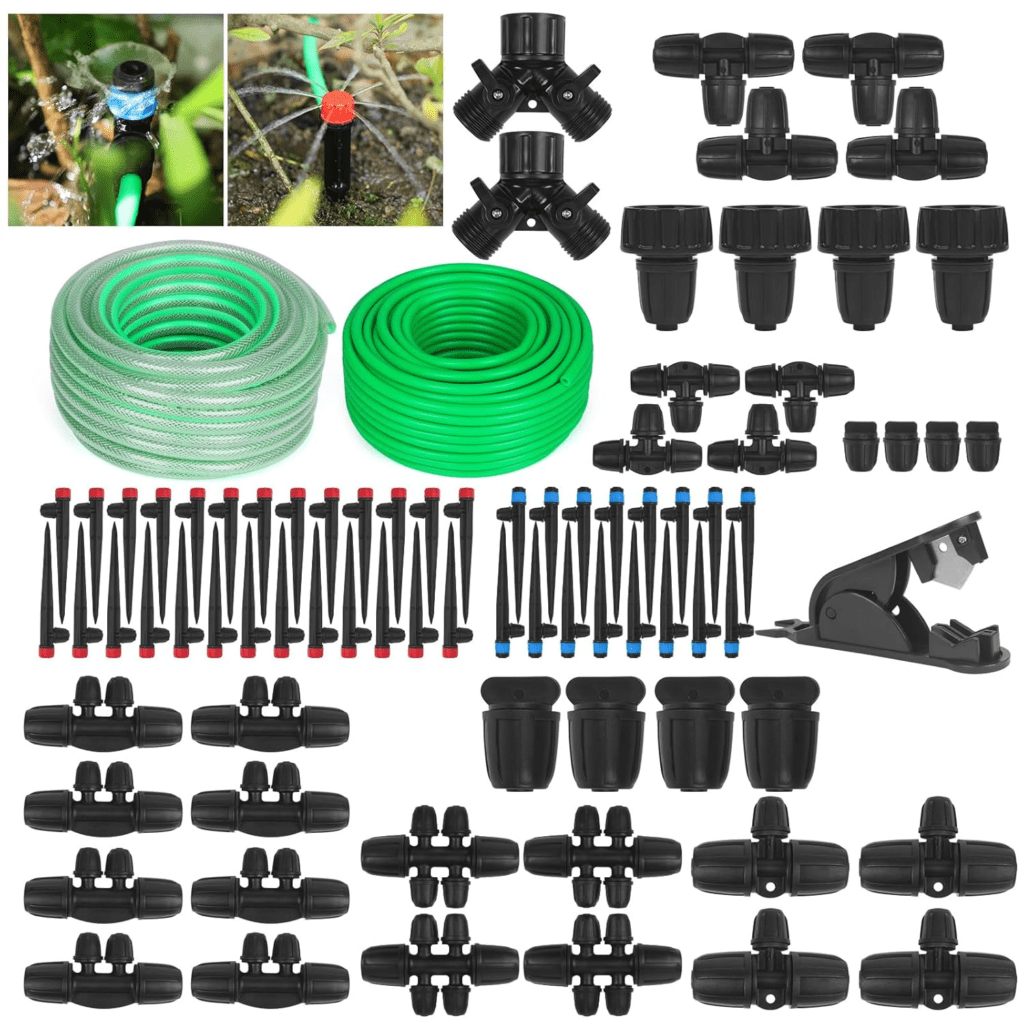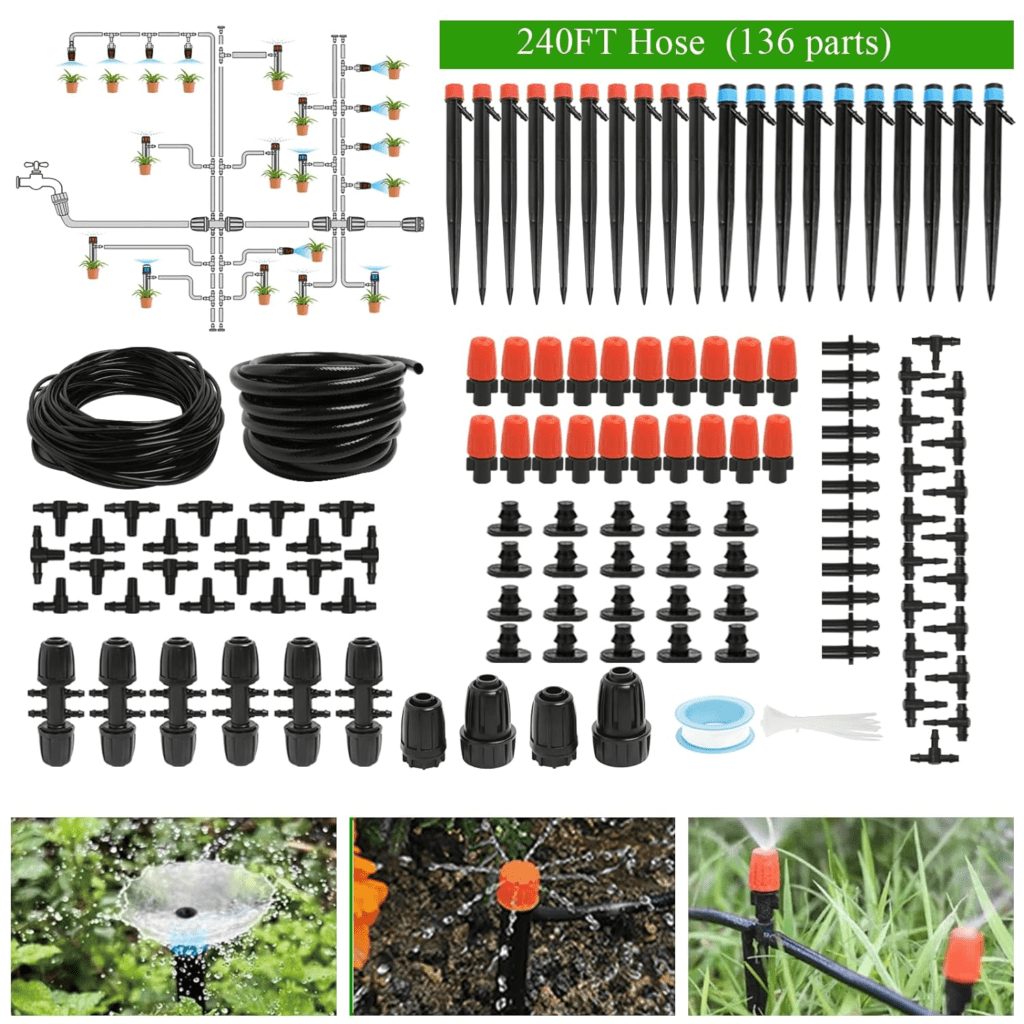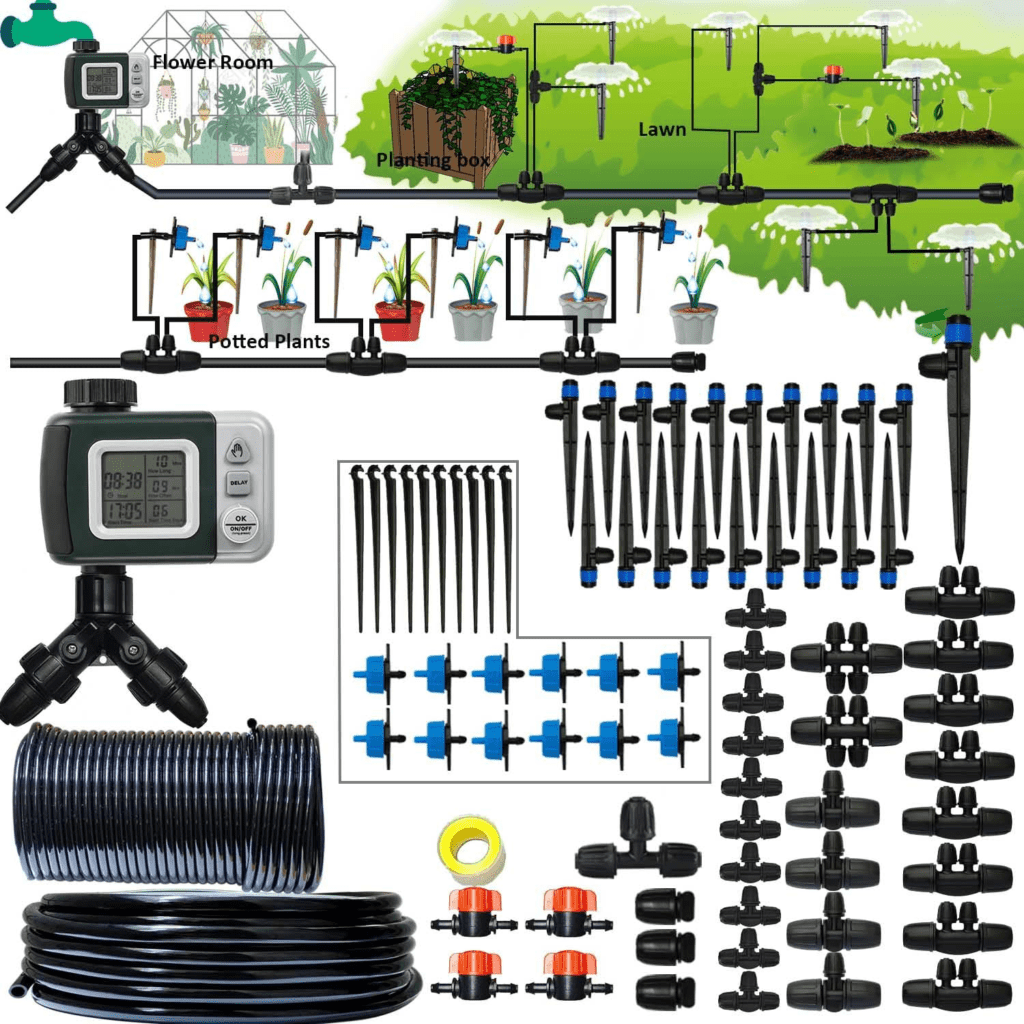Best Smart Irrigation Systems for Farms: Top 4 Picks in 2025
Water management is essential for running a sustainable farm, especially with climate change and growing concerns about conservation. Smart irrigation systems for farms automate and optimize irrigation, improving water efficiency, reducing waste, and boosting crop health. In this article, we review the top four smart irrigation systems for farms in 2024. These systems monitor soil moisture, weather, and crop needs in real-time, ensuring crops get the right amount of water. This not only promotes healthier plants but also cuts water and labor costs, making them ideal for farms of all sizes.
1. Efficient Smart Irrigation System for Farms

The Efficient Smart Irrigation System is a powerful solution for farms of all sizes. This system utilizes cutting-edge technology to automate irrigation schedules, monitor environmental factors, and ensure that your crops get the right amount of water when they need it.
Features and Benefits:
- Weather-Based Adjustments: One of the standout features of this smart irrigation system for farms is its ability to use real-time weather data to automatically adjust watering schedules. This ensures that your crops are never over or under-watered, reducing water waste and promoting healthier plant growth.
- Remote Monitoring and Control: With the help of a mobile app, you can control and monitor your irrigation system from anywhere. This is particularly useful for farmers with large operations who may not always be on-site.
- Water Conservation: The system is designed to optimize water use by providing the exact amount needed for each crop. This smart irrigation system for farms helps conserve water, reduce costs, and minimize the environmental impact of farming.
- Durability: Built to withstand harsh weather conditions, the Efficient Smart Irrigation System is made from high-quality materials that ensure long-term use and reliability.
This system is a great option for farmers looking to enhance their water management practices. By automating irrigation based on real-time data, you can ensure that your crops receive optimal care, even when you’re not around to manually manage the system. Smart irrigation systems for farms like this one are essential for maintaining healthy crops and improving overall farm efficiency.
Buy on Amazon2. Automatic Greenhouse Smart Irrigation System

For farmers who operate greenhouses, the Automatic Greenhouse Smart Irrigation System is a game-changer. Designed specifically for controlled environments, this system provides precise control over watering schedules and is ideal for growing crops that require specialized care.
Features and Benefits:
- Tailored Irrigation for Greenhouses: Greenhouse environments often require more precise water management than open-field farming. This smart irrigation system for farms allows you to set customized watering schedules for different sections of your greenhouse, ensuring that each plant gets the right amount of water.
- Energy Efficiency: This system is designed to be energy-efficient, using minimal power to operate. This not only reduces your energy costs but also makes the system more environmentally friendly.
- Soil Moisture Sensors: Equipped with advanced soil moisture sensors, this smart irrigation system for farms automatically adjusts irrigation based on the moisture levels in the soil. This prevents overwatering, which can be detrimental to certain crops.
- User-Friendly Interface: Even if you’re not particularly tech-savvy, the system is easy to install and operate. The intuitive interface allows you to set up and monitor the system with minimal effort.
For farmers who rely on greenhouses, this system is an excellent choice. Its ability to provide precise irrigation in controlled environments makes it one of the top smart irrigation systems for farms that grow specialized crops. The energy efficiency and advanced soil moisture monitoring also make it a great long-term investment.
Buy on Amazon3. MIXC Greenhouse Smart Irrigation System

Another great option for farmers looking to improve their greenhouse irrigation is the MIXC Greenhouse Smart Irrigation System. This system offers customizable water flow options and comes with adjustable components, making it ideal for farms that grow a variety of crops.
Features and Benefits:
- Customizable Water Flow: With this smart irrigation system for farms, you can easily adjust the water flow to meet the specific needs of each plant. This is especially useful for greenhouses where different crops may require different amounts of water.
- High-Quality Tubing: The system comes with durable tubing that can withstand regular use and harsh weather conditions. Whether you’re using it in a greenhouse or an outdoor setting, the MIXC system is built to last.
- App Integration: Like other smart irrigation systems for farms, the MIXC system can be controlled via a mobile app. This allows you to monitor and adjust the system remotely, giving you more flexibility in managing your farm’s irrigation.
- Time-Saving: The system can be set to follow specific irrigation schedules, saving you time and effort. You won’t need to manually water your crops, as the system takes care of everything for you.
This system is perfect for farmers who need a flexible, customizable irrigation solution. Its adjustable settings make it one of the most versatile smart irrigation systems for farms, and its durability ensures that it will provide reliable service for years to come.
Buy on Amazon4. Smart Watering System for Large-Scale Farms

For large-scale farms, the Smart Watering System is the best option. This system is designed to irrigate extensive areas, ensuring consistent water distribution across your entire farm. It’s ideal for farmers who manage large plots of land and need an efficient way to ensure that all crops are adequately watered.
Features and Benefits:
- Wide Coverage: One of the most important features of this smart irrigation system for farms is its ability to cover large areas. It can efficiently irrigate even the farthest reaches of your farm, ensuring that all crops receive the necessary water.
- Soil Moisture Monitoring: Equipped with soil moisture sensors, this system constantly monitors the water content in the soil and adjusts irrigation accordingly. This feature helps prevent both overwatering and underwatering, ensuring that your crops are always receiving the optimal amount of water.
- Remote Control: Like other smart irrigation systems for farms, this system can be controlled remotely via a smartphone app. You can monitor water usage, adjust schedules, and control the system from anywhere, giving you peace of mind when you’re away from your farm.
- Water Efficiency: By only delivering water when it’s needed, this smart irrigation system for farms helps conserve water and reduce costs. It’s an ideal solution for farmers looking to optimize their water usage while maintaining crop health.
For large-scale operations, this smart irrigation system for farms is an essential tool. It ensures that all of your crops are receiving the water they need, while also helping you conserve water and reduce costs. The system’s advanced features make it one of the most efficient and reliable options for farmers managing extensive plots of land.
Buy on AmazonFAQs
What are smart irrigation systems for farms?
Smart irrigation systems for farms are automated solutions that use advanced technology to monitor and manage the watering of crops. These systems rely on data from various sources, such as weather forecasts, soil moisture sensors, and plant-specific needs, to determine the ideal amount of water for each area of your farm. Smart irrigation systems for farms streamline the watering process by automating it, meaning you don’t have to worry about manually adjusting schedules or overwatering.
By utilizing smart irrigation systems for farms, you can reduce water waste, boost crop health, and minimize the amount of time spent managing irrigation. These systems take the guesswork out of farming by using real-time data to ensure that crops receive the water they need when they need it. In doing so, smart irrigation systems for farms also help you save money on water bills and labor, making them a highly efficient tool for modern agriculture.
How do smart irrigation systems for farms conserve water?
Smart irrigation systems for farms are designed to conserve water by making precise adjustments to irrigation schedules based on real-time data. For instance, if a smart system detects recent rainfall, it will automatically skip the next scheduled watering session to avoid overwatering. Similarly, if the soil moisture sensors indicate that the ground is still moist, the system will delay the irrigation, ensuring that crops do not receive unnecessary water.
The ability of smart irrigation systems for farms to respond to environmental changes helps prevent water waste, which is a critical concern in regions prone to droughts or water shortages. By using only the water necessary for crop growth, these systems help lower water usage and reduce your water bills. Smart irrigation systems for farms contribute to sustainable farming practices by ensuring efficient water management.
Can smart irrigation systems for farms work in greenhouses?
Yes, smart irrigation systems for farms are often designed to function in a variety of environments, including greenhouses. Many smart irrigation systems for farms are specifically tailored for use in controlled environments, like greenhouses, where water management needs to be more precise. These systems allow farmers to customize watering schedules, ensuring that each crop receives the exact amount of water required based on its specific needs.
In a greenhouse, smart irrigation systems for farms provide even more benefits because they can adjust watering based on factors like humidity, plant growth stage, and temperature. This level of control is crucial for high-value crops that need precise growing conditions to thrive. Smart irrigation systems for farms can also be adjusted remotely, which is particularly useful for farmers who want to maintain their greenhouse crops without being physically present.
How much can I save by using smart irrigation systems for farms?
The amount of money you can save by using smart irrigation systems for farms depends on several factors, including the size of your farm, the types of crops you grow, and your water usage before implementing the system. On average, most farmers report water savings of 20-40% after adopting a smart irrigation system. These systems help prevent overwatering by adjusting schedules based on real-time conditions, which in turn reduces water waste and lowers utility bills.
In addition to water savings, smart irrigation systems for farms can improve crop yields, which directly impacts your profitability. By ensuring that your crops receive the proper amount of water, these systems help plants grow more efficiently, leading to higher-quality harvests. Over time, the financial savings from reduced water bills and improved yields can more than justify the initial investment in smart irrigation systems for farms.
What is the best smart irrigation system for small farms?
For small farms, a system like the Efficient Smart Irrigation System is an excellent option. Smart irrigation systems for farms on a smaller scale should offer features such as weather-based adjustments and remote control to make managing irrigation easy and efficient. The Efficient Smart Irrigation System allows farmers to automate their watering schedules while providing precise control over the amount of water used.
This system is also user-friendly, making it a great choice for farmers who are new to smart irrigation technology. Its cost-effectiveness is another major benefit for small farms, as it provides advanced functionality without requiring a large upfront investment. Small farm owners can benefit greatly from smart irrigation systems for farms that offer both affordability and reliable performance.
Are smart irrigation systems for farms difficult to install?
Most smart irrigation systems for farms are designed to be easy to install, even for those without technical expertise. Many systems come with detailed, step-by-step installation guides, and some are even designed for DIY installation without professional assistance. Smart irrigation systems for farms often include all the necessary components, such as sensors, controllers, and app-based management tools, to make the process as simple as possible.
For larger or more complex farm setups, however, you might want to consult a professional installer to ensure everything is set up properly. Smart irrigation systems for farms can sometimes involve integrating with existing irrigation infrastructure, and having an expert handle the installation can provide peace of mind. But for most small to medium-sized farms, installation is straightforward and manageable with the included instructions.
Can I control smart irrigation systems for farms remotely?
Yes, most modern smart irrigation systems for farms come with remote control capabilities. These systems are designed to be accessible from your smartphone, tablet, or computer, allowing you to monitor and adjust your irrigation schedule no matter where you are. Remote control features are especially useful for farmers who manage multiple plots of land or who travel frequently and still want to keep an eye on their farm’s irrigation system.
By using smart irrigation systems for farms with remote control capabilities, you can make real-time adjustments based on weather conditions or soil moisture levels. This allows for greater flexibility and control over water usage, helping you to react quickly to changes in weather or other environmental factors. Remote access is one of the many benefits of using smart irrigation systems for farms in today’s tech-driven world.
How do smart irrigation systems for farms benefit crop health?
Smart irrigation systems for farms play a crucial role in improving crop health by ensuring that plants receive the optimal amount of water. These systems prevent overwatering, which can lead to root rot and other issues, as well as underwatering, which can stunt plant growth. By maintaining consistent and ideal soil moisture levels, smart irrigation systems for farms promote healthier plants and stronger yields.
The precise water delivery provided by smart irrigation systems for farms also leads to more efficient use of nutrients, as the right amount of water helps dissolve and distribute fertilizers more effectively. Healthier plants are more resistant to disease and pests, resulting in better overall crop performance. With smart irrigation systems for farms, you can significantly improve the quality and quantity of your harvest.
What should I look for when choosing smart irrigation systems for farms?
When selecting smart irrigation systems for farms, several key factors should be considered. First, evaluate the size of your farm and the types of crops you grow. Larger farms may need systems with more extensive coverage, while smaller farms may benefit from more compact and cost-effective solutions. Also, consider the local climate and whether the system offers features like weather-based irrigation adjustments and soil moisture sensors.
Look for smart irrigation systems for farms that are easy to install and operate. Remote control capabilities are another essential feature, especially if you manage multiple farms or travel frequently. Additionally, ensure that the system is compatible with any existing irrigation infrastructure you may have, as this can save time and costs during installation.
Are smart irrigation systems for farms worth the investment?
Yes, smart irrigation systems for farms are a worthwhile investment for most farmers. These systems help reduce water usage, save time, and improve crop yields, leading to significant financial savings over time. While the initial investment may seem high, the long-term benefits of smart irrigation systems for farms, such as reduced water bills, labor costs, and better crop quality, make them a valuable addition to any farming operation.
Smart irrigation systems for farms also contribute to sustainable farming practices by promoting efficient water management and conservation. These systems can help farmers meet the growing demands of environmental regulations while improving the overall profitability of their farms. For farmers looking to enhance productivity and reduce costs, smart irrigation systems for farms are an essential tool.
Conclusion
Smart irrigation systems for farms are transforming the way farmers manage water resources. Using technology to monitor weather, soil conditions, and crop needs, these systems optimize irrigation practices, helping farmers conserve water, reduce costs, and improve crop health. Whether you’re managing a small organic farm or a large commercial operation, investing in a smart irrigation system for farms can positively impact your farm’s productivity and sustainability.
If you’re interested in learning more about how to improve the efficiency of your farm, be sure to check out our article on sustainable farming techniques or explore our guide on the best solar panels for farm energy needs. For additional resources on water management and irrigation, visit the Environmental Protection Agency’s WaterSense Program or the USDA’s Natural Resources Conservation Service.
By choosing the right smart irrigation system for farms, you can ensure that your crops receive the care they need while also conserving water and reducing costs. Whether you’re looking for a system to manage a small greenhouse or a large commercial farm, this roundup will surely meet your needs.
